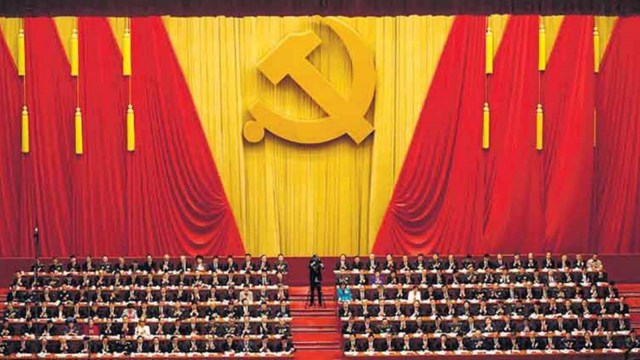
Recent developments in India-China relations, including high-level meetings, suggest that ties are on the mend after prolonged estrangement caused by the bloodletting at Galwan in 2020. The meeting between Prime Minister Narendra Modi and President Xi Jinping at the 16th BRICS summit at Kazan on October 23, 2024, gave new direction to ties.
The resumption of patrolling and grazing activities in eastern Ladakh at the remaining friction points paved the way for disengagement. During recent visits to China for SCO meetings, both Defence Minister Rajnath Singh and External Affairs Minister S Jaishankar have spoken of the need for early de-escalation in the border areas to facilitate normalisation of ties.
This is the first time that a BRICS statement has specifically condemned any terrorist attack in J&K. This vindicates Modi’s proactive stance on combating terrorism as well as the dispatching of all-party delegations to sensitise key nations about Pakistan-sponsored terrorism and Operation Sindoor. It should be recalled that the horrendous 2008 Mumbai terrorist attack had failed to find a place in the then BRIC Countries’ Leaders Joint Statement the following year. There was only a generic condemnation of “terrorism in all its forms and manifestations”. It was in the BRICS Leaders Declaration of September 2017 that mention was made of Pakistan-based Lashkar-e-Taiba and Jaish-e-Mohammad for the first time.
This shows that India and China can reach a consensus on terrorism as part of a broader multilateral context. It may instil confidence at the bilateral level. In the past, China has placed technical blocks on listing Pakistan-based terrorists at the UN. However, the forthcoming SCO summit declaration may not reflect the BRICS formula on terrorism, given Pakistan’s membership of the grouping.
Going by the statements made by the Indian leadership in recent months, it is evident that peace and tranquillity on the border remain integral to the normalisation of ties. It took years to rebuild ties after the border war in 1962. Subsequent developments, unfortunately, belied early hopes of forging a mutually beneficial trade and economic partnership or maintaining peace and tranquillity in the border areas. Frequent tensions have only served to reinforce negative perceptions of one another.
In recent years, the adverse balance of trade with China and the lack of reciprocal market access have shaped public and political opinion in India. Fresh concerns have recently arisen over restrictions placed by China on the export of rare earth magnets for EVs to India, wind turbines and electronics, besides tunnel boring machines and certain high-value fertilisers.
After the establishment of the People’s Republic of China (PRC), the Communist Party of China (CPC) had a jaundiced view of India. Jawaharlal Nehru was maligned as an “imperial lackey”. China failed to appreciate India’s civilisational ethos and the value attached to peace and non-violence. Mahatma Gandhi’s pacifist teachings stood in sharp contrast to Mao Zedong’s advocacy of class struggle and violent means to bring about change. The CPC’s Marxist lens, unfortunately, disregarded the teachings of Taoism, Buddhism and Confucianism, which were part of China’s heritage. They provided a better civilisational connect with India.
Even today, Chinese assessments betray deep suspicion about India’s ties with the US. Beijing views the Quad as an “exclusive clique” that seeks to contain China. Recently, China convened a trilateral meeting with Pakistan and Bangladesh during the China-South Asia Cooperation Forum in Kunming. China’s expanding footprint in South Asia lacks transparency and plays a role in widening the existing fault lines.
China’s “all-weather friendship” with Pakistan has soured bilateral ties with India. The strategic cooperation with Pakistan, including in the defence and nuclear fields, is a case in point. As Operation Sindoor unfolded, Chinese analysts undertook misinformation campaigns to question India’s military success and cast aspersions on its equipment and tactics.
India’s non-participation in the Belt and Road Initiative (BRI) and Beijing’s three Global Initiatives is for a valid reason. The CPEC, a flagship project of the BRI, traverses Pakistan-occupied Kashmir (PoK) and violates India’s sovereignty. Lack of consultation and transparency in regard to China’s growing presence in the region, including the Indian Ocean, is cause enough for misgivings.
Equality and mutual respect should form the bedrock of bilateral relations. Respect for core concerns cannot be one-sided. China frequently seeks reaffirmation from India of the One China principle with regard to Taiwan and Tibet. The presence of the Dalai Lama in India and the succession question are viewed by Beijing as sensitive issues. Yet, Beijing has failed to reciprocate on India’s core interests, whether on Jammu & Kashmir or its nexus with Pakistan.
On the question of equality, it is noteworthy that China considered itself an equal of the US in the 1950s and 1960s at a time when the Chinese economy was but a fraction of what it is today. The moot question is whether China is willing to follow the same logic today in dealing with others, regardless of asymmetries in power.
Perceptions matter. They play a major role in India-China relations. The positive signs in India-China relations are encouraging. The deep deficit of trust, however, calls for sustained efforts. The two sides must move forward with realistic expectations. The road ahead is arduous. Yet, forging a stable and cooperative relationship between the two Asian neighbours is a goal worth pursuing.
The writer is a former ambassador and director general of the Manohar Parrikar Institute for Defence Studies and Analyses. Views are personal